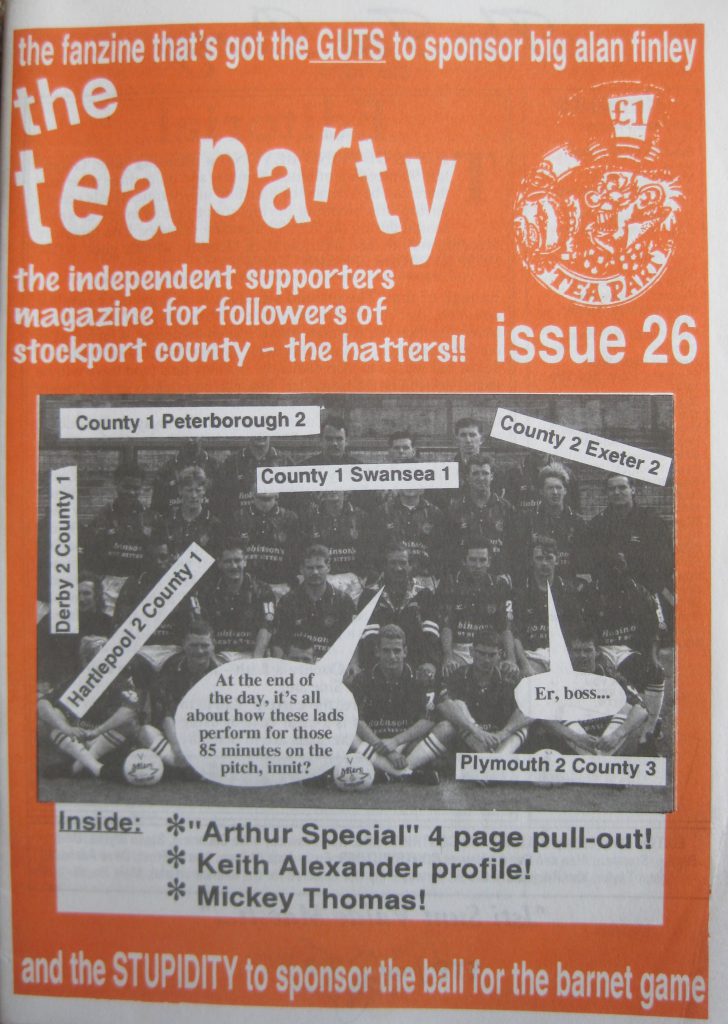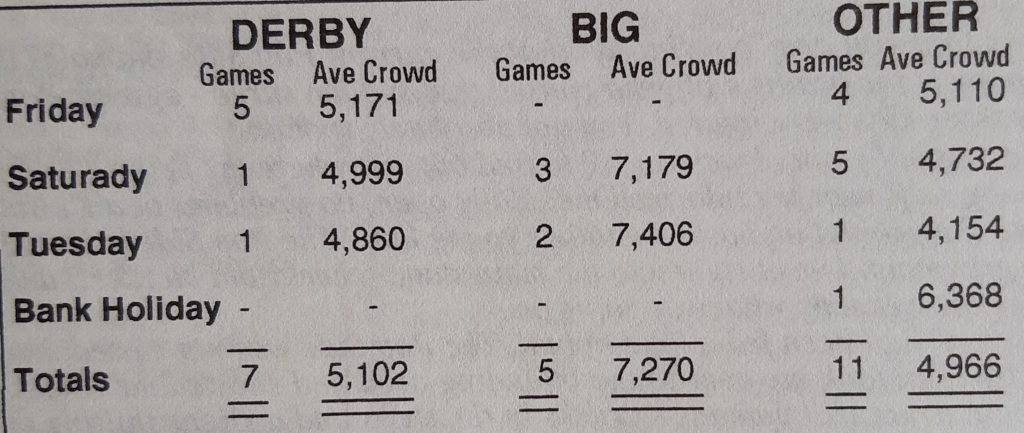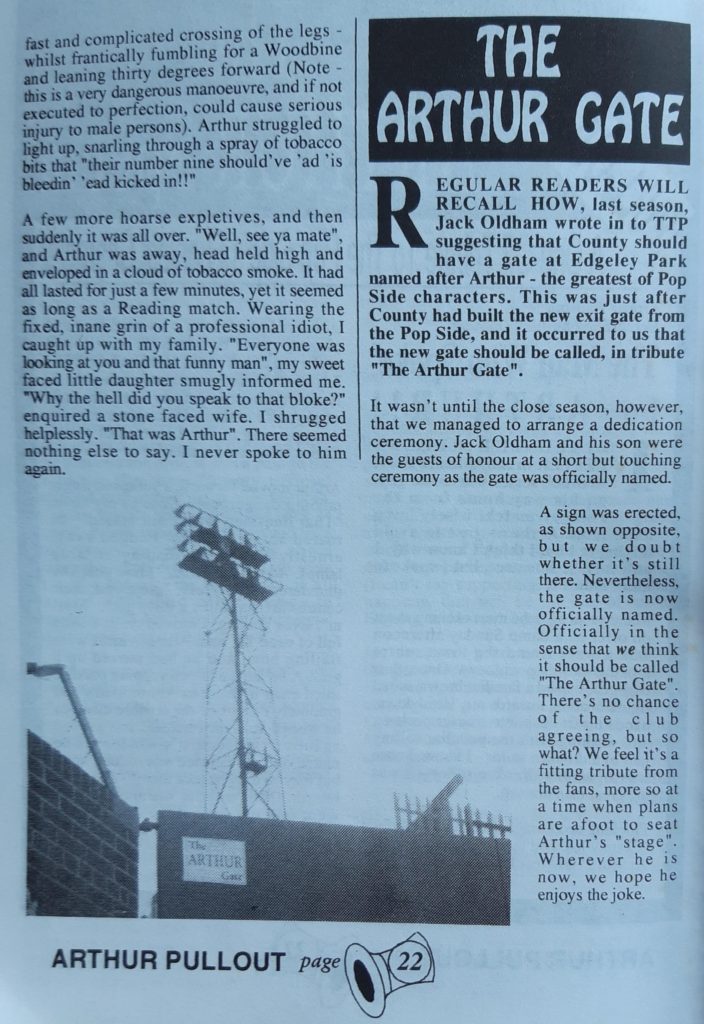FRIDAY NIGHT ISN’T COUNTY NIGHT

I was, and, if truth is known, am still a firm believer that Friday night should be County night. I do however recognise that it has hardly been practical in the last decade or so, given that we have been in semi-professional, part-time football. I know that I am regarded as a dinosaur in this context but no-one will ever tell me that football ‘under the lights’ isn’t more atmospheric than on a Saturday afternoon. But taking that aside, there was a clear economic benefit to the Club in playing on a Friday back in the 60’s, 70’s and 80’s. The new regime of Brendan Elwood was hell bent on moving away from this and they took the opportunity with open hands when the Football League determined, prior to the 1993/94 season, that all weekend games would be on a Saturday. I penned the following piece to try and outline why I thought this was a bad move. It refers to a letter to the Football League. My piece noted that at the time of writing I had not had an acknowledgement nor a reply. I never did get one!! Typical of football administrators who had, and in my opinion continue to have, no concept of communicating with customers.
..
**********
..
Towards the end of the 1991/92 season I contributed an article to TTP which looked at the impending end of Friday night football at Edgeley P. (TTP 12a – Ed)
This article arose from a statement of Brendan Elwood’s where he said that in future he intended to have all big games on a Saturday and certainly during 1992/93 we saw this happen with the Stoke, West Brom, and Burnley matches.
Things have moved on since then and this summer the Football League in its wisdom has decided that all weekend matches will be played on Saturdays unless police advice or the demands of the TV companies dictate otherwise. I was sufficiently annoyed at this to write to the FL asking for the rationale behind this decision. A copy of my letter is reproduced below. Hardly surprisingly I have not the time of writing this, (31st July), received an acknowledgement never mind a reply. What has been interesting however has been the reaction of the two clubs most affected in the north west – County and Tranmere.
Tranmere have protested loud and long having enlisted the assistance of the council, MPs, and even the police and have gone to the extent of being prepared to do without the contribution from the pools companies in their attempt to preserve Friday football. They clearly recognise the financial and motivational benefits of Friday’s.
On the other hand County seem to have meekly accepted the decision; the only public response being that whilst they were disappointed they felt the crowds had improved sufficiently in recent years for Saturday football to be now viable.
In order to see whether or not this assertion is correct I have looked at the crowds for all League matches played at EP in 1992/93. In general I think there are three categories of match.
Derby matches: I have defined these as being where the travelling time for the visitors is less than one hour – in 1993/94 these will be Blackpool, Bradford, Huddersfield, Rotherham and Wrexham.
Big matches: these are games involving opponents with a large following irrespective of the time or day a game is played. (Burnley and Port Vale).
Other matches: These involve visitors from a fairly long distance, (Barnet, Bournemouth, Brentford, Brighton, Bristol Rovers, Cambridge, Cardiff, Exeter, Fulham, Hartlepool, Hull, Orient, Plymouth, Reading, Swansea and York).
In 1992/93 the average crowds these categories of game work as per the table below.

The total attendance for the season is 126,688. Using the same sort of analysis and assuming that should a game played on the same day in 1993/94 as in 1992/93, (eg Bournemouth on a Saturday), and that the average crowd for each type of game on a Saturday will apply to the 1993/94 fixtures the total attendance will be just over 112,000. The reduction is a consequence of the loss of the big games against Stoke, West Brom, and Bolton and also the loss of nine Friday fixtures. At an average entrance fee of £6.50 the crowd loss of 14,000 amounts lost income of over £90,000.
Faced with such a reduction in income any business would look to recoup this by considering its market. My previous contribution suggested that County optimise both football and financial aspects by maximising Friday football. The table above quite clearly demonstrates that with the exception of the big matches attendances on a Friday are greater. In this position County should have fought that proposal as have Tranmere and if successful have made approaches to visiting clubs for a switch to Friday. Based on past experience it is likely that 10 clubs would have agreed to this either because they have agreed in the past or because they play on a Friday themselves. These are Blackpool, Burnley, Cambridge, Fulham, Hartlepool, Huddersfield, Plymouth, Port Vale, Rotherham and Wrexham. By applying the average Friday crowds for the various type of fixture in 1992/93 the total gate for the season would increased by around 6,500 effectively producing additional receipts of around £40,000 . This would go some way to meeting the loss of revenue from the loss of big games.
So the question is why haven’t County fought against this? Yes there will be additional money from the pools companies from an increase in Saturday games but to what extent will this offset the overall loss. I believe that Friday is the traditional County night because both the crowd and the atmosphere is better. The club should have fought against this control from the centre and told the Football League that its best interests are met by ensuring that the best interests of its member clubs down that. This can only mean that interest should be maximised locally which in County’s case means Friday night football.
July 1993
Letter to Mr JD Dent, (Secretary of the Football League), 18th June 1993
Dear Sir
I write in respect of the recent decision of the Football League to allow weekend League games in the forthcoming season solely on a Saturday other than for reasons of police instruction or in connection with contracts with television companies. The coverage in the press has frankly been less than comprehensive on this issue and therefore I am unaware of whether this decision has arisen from a vote amongst member clubs or is merely an instruction from within the Football League. My comments below should therefore be read within this context.
I should commence by saying that I am a supporter of Stockport County FC who you will be aware were amongst the first clubs to introduce Friday night football some 25 years ago. It will not therefore be difficult to gauge the tenor of my comments although I am unaware of the clubs own view on this issue.
As a part of the entertainment industry football must regard itself as a business as well as a sport. The basic principle of business is the provision of what the customer requires when it is required. Clearly the market for football cannot be generalised and ranges from area to area dependent on the number of clubs in a particular area and so forth. There has been more than sufficient coverage given recently to the financial plight of various clubs and therefore, as governing body, the Football League should be assisting all clubs in maximising the opportunity for increasing attendances. One basic principle, however, must be that clubs should not be placed in unnecessary competition with more affluent and better supported neighbours. Initially therefore I regard the recent decision as a complete abrogation of business principles.
It can of course be argued that allowing Friday night / Sunday football may affect revenue from the Pools Promoters Association should it be allowed to become prevalent. I believe that the existing rules allow for a maximum of a certain number of fixtures each weekend to be rearranged so clearly that come in no problem in that area. Additionally, although many clubs have experimented with Friday night and Sunday football, it is apparent that few have persevered and it can be no coincidence that with the exception of Colchester United there is considerable competition within the geographical areas of those clubs. The economic arguments outlined above are therefore justified. Indeed for Stockport with the exception of fixtures involving clubs such as Stoke City or West Bromwich Albion the attendance for a Friday night fixture is anywhere up to 1,000 greater than would be the case on a Saturday afternoon. Can the Football League in all honesty justify the loss of such revenue to its member clubs?
Turning to some of the other arguments which could be used to support the recent decision.
Given the fact that the visiting club already has a right to refuse a fixture change and indeed receives no element of gate money that can be no argument regarding excessive travelling and accommodation expenses. Travelling supporters, it can be argued, are indeed inconvenienced by a change from a Saturday and it is difficult to sustain a general argument against this. However, within the 2nd division a vast proportion of clubs are based in the North and Midlands where travel is not arduous. For those clubs in the South it is arguable that those supporters who travel will do so whenever games are played – this argument becomes stronger lower down the League. I would add that bearing in mind the general attitude of the football hierarchy to the ordinary supporter I find it inconceivable that the impact on supporters played any part in this decision.
The final factor relates to television coverage. The decision as I understand it allows for re-arrangement of fixtures at the behest of TV companies. As a generalisation my argument concerning football a business means that there is a continuing need to explore such sources of revenue. However why re-arrangement for TV purposes is sanctioned and yet the opportunity to maximise income by other avenues of fixture re-arrangement has been eradicated is surely illogical. Locally this is further worsened by the fact that Stockport and Tranmere, longstanding Friday night clubs, are based in a TV area where the local TV company, Granada, has not the slightest interest in showing live football other than play off matches.
In summary therefore I am concerned at this recent decision and invite your comments on the following issues
1. At whose instigation was the proposal for change introduced?
2. Was the decision that of the member clubs or taken by some other body or individual?
3. What justification has been advanced for the change?
4. Any other comments you might like to make
Yours Sincerely
Martin Frost
..
*****
..

Also in TTP 26, (but not authored by me), was a special pull out on one of the real County characters of the 1970’s – Arthur Cooper. His activities chasing the linesmen along the Pop Side touchline were a joy to behold


Recent Comments